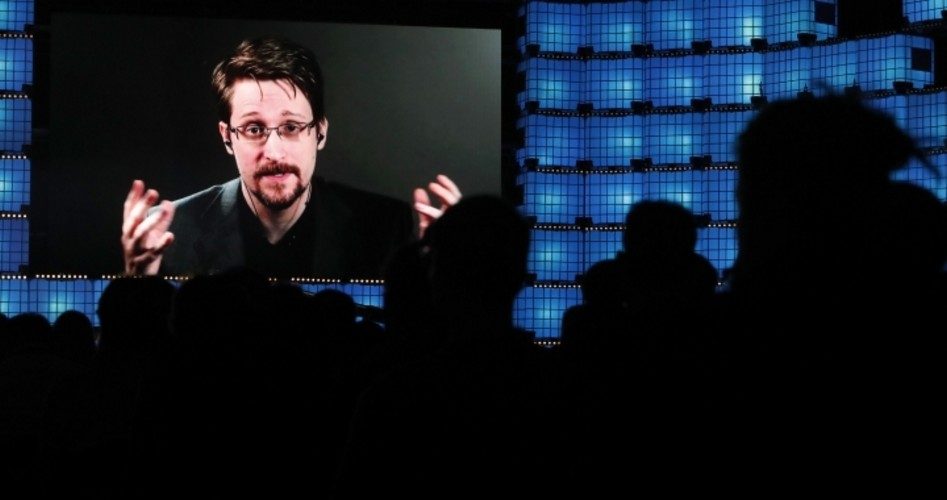
During President Trump’s interview with the New York Post on Thursday, the name of whistleblower Edward Snowden came up in the context of the spying by the Obama administration on the Trump campaign now coming to light. Said the president,
When you look at [former FBI Director James] Comey and [former FBI Deputy Director Andrew] McCabe, and [former CIA Director John] Brennan — and, excuse me, the man that sat at this desk, President Obama, got caught spying on my campaign with Biden. Biden and Obama, and they got caught spying on the campaign….
Snowden is one of the people they talk about. They talk about numerous people, but he is certainly one of the people that they do talk about.
I guess the DOJ is looking to extradite him right now?… It’s certainly something I could look at. Many people are on his side, I will say that. I don’t know him, never met him. But many people are on his side.
At a press briefing Snowden’s name came up again:
I’m not aware of the Snowden situation. Many people think he should be somehow treated differently and other people think he did very bad things.
I’m going to take a look at that very strongly.
One of those who think Snowden was treated unfairly is Senator Rand Paul (R-Ky.). He tweeted: “I’m one of them. Snowden revealed that Trump-haters Clapper and Comey among others were illegally spying on Americans.”
Representative Thomas Massie (R-Ky.) agreed:
Employees of the U.S. government violated the Constitution and lied to Congress and the American people about it.
Snowden exposed them.
This is bigger than him. It he’s punished for his service to the Constitution, there will be more violations of the Constitution, and more lies.
Snowden worked for government contractor Booz Allen Hamilton as an employee of the Central Intelligence Agency (CIA) until June, 2013. His employment ended when he provided thousands of classified National Security Agency (NSA) documents to reporter Glenn Greenwald of The Guardian and the paper published many of them.
Said Snowden:
I could watch drones in real time as they surveilled the people they might kill. I watched NSA tracing people’s Internet activities as they typed.
I realized the true breadth of this system. And almost nobody knew it was happening.
In June 2013, the first of Snowden’s disclosures was published, and on June 14, the Department of Justice charged Snowden with espionage. A few days later the State Department revoked his passport, leaving him stranded in Russia (on his way to Ecuador, which had granted him asylum). He remains in Russia on a permanent resident basis.
When the Pulitzer Prize was given to the Washington Post for its role in helping publicize Snowden’s revelations, the paper’s executive editor, Martin Baron, defended Snowden:
Disclosing the massive expansion of the NSA’s surveillance network absolutely was a public service. In constructing a surveillance system of breathtaking scope and intrusiveness, our government also sharply eroded individual privacy. All of this was done in secret, without public debate….
[Without Edward Snowden’s disclosures] we never would have known how far this country had shifted away from the rights of the individual in favor of state power. There would have been no public debate about the proper balance between privacy and national security….
None of this would have been possible without Snowden’s release of classified information. I understand that’s a source of controversy, but without his disclosures there would be no discussion of the shift from the rights of the individual to state power, no debate about the balance between privacy and national security.
Snowden defended himself against accusations of treason:
The NSA has built an infrastructure that allows it to intercept almost everything. With this capability, the vast majority of human communications are automatically ingested without targeting.
If I wanted to see your emails or your wife’s phone, all I have to do is use intercepts. I can get your emails, passwords, phone records [even] credit cards.
I don’t want to live in a society that does these sort of things.… I do not want to live in a world where everything I do and say is recorded. That is not something I am willing to support or live under….
Even if you’re not doing anything wrong, you’re being watched and recorded. The storage capability of these systems increases every year, consistently, by orders of magnitude, to where it’s getting to the point where you don’t have to have done anything wrong, you simply have to eventually fall under suspicion from somebody, even by a wrong call, and then they can use this system to go back in time and scrutinize every decision you’ve ever made, every friend you’ve ever discussed something with, and attack you on that basis, to sort of derive suspicion from an innocent life and paint anyone in the context of a wrongdoer.
Greenwald also thinks, along with Paul and Massie, that Snowden should be pardoned:
And now conservatives see how easily NSA’s mass surveillance system, and the entire intelligence community apparatus, can be weaponized and abused for improper ends.
What Snowden showed the world was crucial for it to know. He’s spent seven years in exile.
He should be pardoned.
Photo: AP Images
An Ivy League graduate and former investment advisor, Bob is a regular contributor to The New American, writing primarily on economics and politics. He can be reached at [email protected].
Related articles:
Flak Over Washington Post’s Pulitzer for Snowden NSA Revelations
The Predictable Response to Edward Snowden’s Disclosure of PRISM



